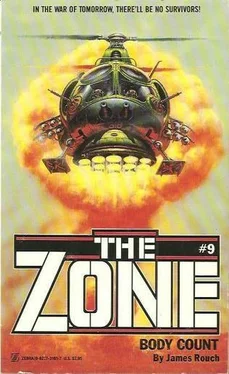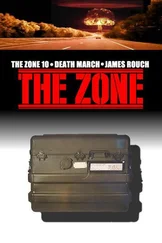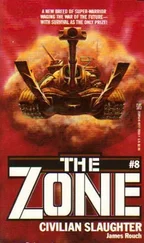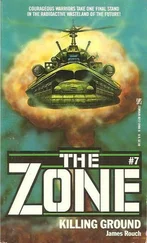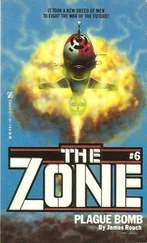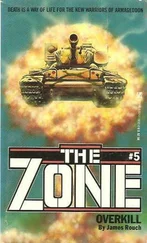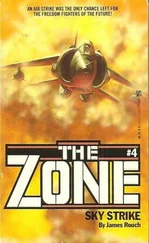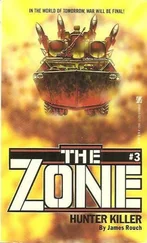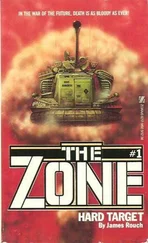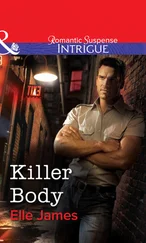They moved on steadily. Here the autobahn ran through the centre of derelict land. It must once have been a vast switching yard. There was little sign of it remaining. Broad swathes of concrete and ballast, broken only by intruding clumps of weeds, alternated with patches of stunted shrubs.
On the far side stood a vast clutter of stainless steel towers, a chemical plant. Flanking it, and stretching away out of sight, were the globes and tanks of a storage farm.
Above a slim stack, a flare burned brightly against the overcast sky. Plumes of steam rose from long runs of piping. Warning lights marked the top of the taller structures.
A half kilometre ahead, Revell saw a big road junction. On a flyover that crossed the interchange, the flashing lights of police vehicles were seen. If the Spetsnaz had already managed to bluff their way through the roadblock, then the whole of West Germany lay open to them. But if they had not reached it yet, then within the next ten minutes the section would come up on them.
Scanning the autobahn ahead, Revell noticed a single-deck bus. It was a large six-wheeler, of the type designed for long distance travel. Most of its curtains were closed. Though one or two were not, it was impossible to see in through the tinted glass.
“If they’re anywhere, that’s where they’ll be.” Revell was happy to hear his thoughts echoed by his sergeant. He eased off the safety catch on his MP5. With all the mental power he could summon, he was willing the Russians to make a run for it. Hemmed in as it was, there was no chance of the bus crashing clear.
At the front end of the long vehicle, an automatic door folded back and steps came down. Revell could guess what was coming.
There was a lot of shouting and cries of fright and pain as the civilian passengers were forced out. With the Russian soldiers mingled among them, they threaded their way between the cars and trucks. Threats and brutality were employed to move the group off the autobahn.
“You keep back.”
Revell didn’t see who it was who shouted. He heard a shot and saw an elderly man crumple. Blood spurted from a gaping head wound. Again a heavily accented voice came from among the hostages. “You keep back, or we make a lot more like that.”
Rifle butts and boots were used to club and kick the captive civilians to silence. Among them a woman sobbed loudly. Shouted orders failed to quieten her, and there was aloud, ugly cracking sound as she was felled.
The rest were dragged backwards, shielding the Russians. From somewhere among the group, an AK47 spat a long burst. High at first, the last shots found marks among the still moving files of traffic.
Collisions occurred as cars went out of control, their drivers hit, or gripped by blind panic. Within seconds the road was jammed, and doors were being thrown open as passengers bolted for the far side of the road.
“You reckon that’s all of them?” Hyde watched the ill-assorted group making its erratic progress across the broken ground towards the chemical plant.
“I’ve been trying to do a head count.” Revell was waiting until the range opened further before attempting pursuit. Leaving the cover of the stalled vehicles would be a dangerous move. They would have no human wall for cover. “Taking an average of three attempts, I make it twelve. Looks like we’ve got the lot of them.”
But not yet they hadn’t. Already, even hampered by their hostages, the Spetsnaz were halfway to the complex’s perimeter fence.
“Once they get in there, it’s going to be a hell of a job to find them.” Hyde checked the spare magazine he carried. “The place must cover a whole square kilometre. It’s vast.”
“I can’t say I’m wildly enthusiastic about conducting a fire-fight in there.” For the first time since they’d engaged the Russians in Munich, Revell was glad their ammunition did not include tracer rounds. Even so, a spray of any type of bullets among the pressure and storage tanks was likely to have a spectacular and lethal effect.
When four hundred meters separated them, Revell gave the order to advance. Despite the fact that it was flat, walking was not easy. Ripples of ballast and splintered ties lay hidden among the weeds.
Revell saw a woman’s shoe and, within a few paces, speckles of blood on a bed of sharp granite chippings. The footwear’s recent owner would be likely to slow the Russians. There was nothing Revell could do to prevent what he knew to be inevitable. A moment later there came a single shot.
Halted by the chain link fence and its topping strands of razor wire, the Russians formed the terrified civilians into a crescent about them as they tackled the obstacle.
Several shots were aimed at the advancing troops, and at three hundred meters, Revell ordered them down. Even at that distance, he could hear the wires snapping and whipping as their tension was released.
It was all a question of timing. Having almost achieved their objective, the Russians were unlikely to waste ammunition gunning down the civilians. If Revell and his men advanced too soon though, several of them would fall in the inevitable fire fight.
Once through the fence, Revell was sure the Spetsnaz would abandon their hostages. They had only a strip of gravel and a perimeter road to cross, then they would be in among the mass of pipes and distillation towers that filled the site. In that great metal maze, they could go off in any direction. So large an installation would have a substantial staff. Their presence offered fresh captives if required, and certainly replacement transport.
A burst of fire zipped overhead. Revell knew the moment had come.
“On your feet. Let’s go.”
If the Russians had left even one rearguard, they were an easy target now. Revell passed the sprawled body of a woman. Ahead the remainder of the civilians huddled together. Beyond them he could see the Russians sprinting for the cover of a stack of pipe fittings.
Andrea had moved out to the flank and stopped to loose off a ten-round burst. A single figure pitched forward, then recovered and tried to regain its feet.
Before Andrea could fire again, one of his comrades turned and aimed his weapon at the wounded man. He appeared to fire, but nothing happened. He threw down the pistol and went after the others.
At the last possible moment, the civilians scattered from the hole in the fence. Hyde dived through first and managed to get off a couple of aimed shots before the Russians were hidden from sight. His second found a mark. A man fell heavily. This time no one came back to try to finish him off.
The Spetsnaz in the road raised himself on one knee. The discarded handgun was close by. Ripper took no chance. His snap shot tore into the man’s throat and he toppled.
The victim of Hyde’s shooting was dead, killed by a bullet that had deformed on impact against the base of his spine. It had gone on through his body to tear a huge exit wound below his ribs.
A little distance away, drops of bloods and scraps of flesh and camouflage material indicated that the sergeant’s first shot had also found a mark.
“Ten left.” Revell looked up, and then off to either side. In all directions the huge complex dwarfed them. “Where the do we start looking.”
“They’ll try to put in a bit of distance at first.” Hyde picked up the pistol. “So I reckon it’ll be a straight line for the first few minutes. Then they’ll make a break to lose us, but whether they’ll dive to the right or left…” He withdrew the pistol’s magazine. I thought maybe that Red didn’t finish off his buddy because his gun jammed. It wasn’t that. It was empty.”
“We can’t count on them all being out of ammunition.” Revell was thinking the same way as the NCO. It had to be unlikely that the Reds would set an ambush for them, but he had no delusions about the dangers of continuing the chase.
Читать дальше
